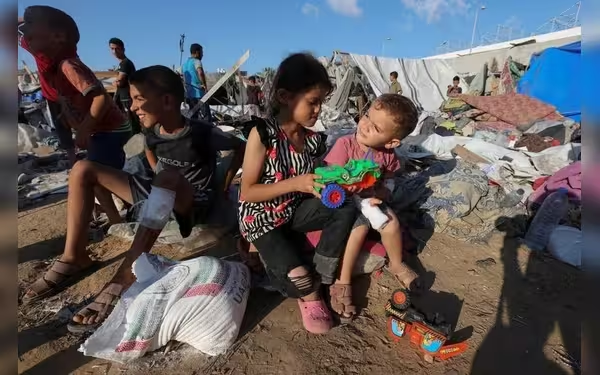Saturday, November 16, 2024 11:25 PM
UNICEF Warns of Gaza Children's Post-Generational Trauma
- Gaza children face severe trauma from ongoing conflict.
- UNICEF highlights urgent need for humanitarian aid.
- Long-term psychological effects threaten future generations.
 Image Credits: thefrontierpost
Image Credits: thefrontierpostUNICEF warns that Gaza's children face severe trauma and long-term challenges due to ongoing conflict, highlighting urgent humanitarian needs.
The ongoing conflict between Israel and Hamas has created a dire situation in Gaza, particularly for the children who are caught in the crossfire. Since the fighting escalated on October 7, 2023, the region has witnessed devastating military operations that have resulted in significant loss of life and widespread displacement. UNICEF, the United Nations agency focused on children's welfare, has raised alarms about the long-term effects this conflict will have on the younger generation.
Catherine Russell, the executive director of UNICEF, recently expressed her deep concerns regarding the situation in Gaza. She described the environment through the eyes of a child as a "hellscape," highlighting the severe trauma that these young individuals are experiencing. The ongoing violence has led to the deaths of many family members, leaving children not only without their loved ones but also without basic necessities such as food and clean water.
Russell emphasized that the psychological impact on these children is profound. She stated, "They are so traumatized by what’s happening," indicating that the scars left by this conflict will not only affect them in their childhood but could also extend into future generations. The term "post-generational challenges" refers to the lasting effects of trauma that can influence the mental health and well-being of children as they grow into adults, potentially affecting their own children.
Despite the challenges, UNICEF has managed to achieve some successes in the region, such as vaccinating thousands of children against polio. However, Russell noted that delivering humanitarian aid remains a dangerous endeavor, particularly with the ongoing military operations in nearby Lebanon targeting the Iran-backed group Hezbollah. She remarked on the "speed and intensity" of these operations, which complicate efforts to assist the nearly 1 million displaced individuals in the area.
The situation in Gaza is a stark reminder of the impact of war on the most vulnerable members of society—children. As the world watches, it is crucial to recognize that the effects of this conflict will linger long after the fighting stops. The need for humanitarian aid and psychological support for these children is urgent, and it is imperative that the international community comes together to address these challenges. Only through collective action can we hope to mitigate the long-term consequences of this tragic situation and help rebuild the lives of those affected.













